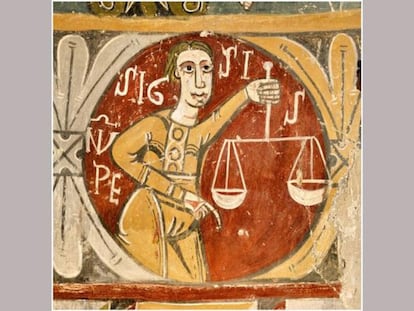When the stars manifest through your phone: The boom of astrology apps
According to psychologists and astrologers, these applications owe their popularity to the people’s need for self-knowledge and guidance

In the past, the weekly predictions used to appear in the back pages of your favorite gossip magazine; maybe in a corner of the newspaper, not far from the crossword puzzle. Now the analysis goes deeper: the Moon, the Sun or the ascendant are taken into account, Mercury retrograde is extensively discussed on social media and many supposedly accurate apps are available for your phone. “I have never believed in astrology or any of that shit, but The Pattern is amazing me with everything it gets right about my personality and situations. I love it because it helps me analyze and understand myself better. I don’t know why,” explains a user on Twitter.
All you need to do is enter your place, date and time of birth, and The Pattern promises “in-depth insights” about the personality or the life situation of whoever downloads it. It is more complete than its competition (CoStar, for example, only gives the user one brief sentence a day) and offers long texts that revolve around specificities such as cycles. You can even connect with another profile to analyze your compatibility. Its preliminary launch took place in 2017, founded by the actress and youtuber Lisa Donovan; by 2021 the app had more than 15 million users, both anonymous and famous, such as the writer and actress Issa Rae.

Reading the horoscope to understand yourself
According to the Argentinean psychologist and astrologer Gabriel Casanova, these apps respond to identity concerns. “I think that the need to connect in societies with so little capacity to focus on relationships is leading us more and more to try to find tools that can make these connections deeper.” Casanova specialized in those two fields because, from his point of view, both pursue a common goal: finding meaning in life. “They can be valuable tools for those who seek a greater understanding of themselves and their place in the world,” he reflects, “and can complement each other for a fuller exploration of the human experience.”
Both he and the Spanish astrologer and psychologist Laura Sakina allude to the Swiss psychiatrist Carl Gustav Jung, founder of the school of analytical psychology, because he was also interested in science and the study of the stars as compatible realities. For Sakina, the desire to investigate this knowledge arises from a “very strong paradigm shift.” Technology advances, people connect, artificial intelligence creates images that seem real and writes pretty poems, but humans still cling to the same questions. “In the end, life cannot be controlled,” she says. Astrology helps her, she says, to draw a map. “But it is there so you can get out of it, you have to transcend it.”

The dark side
According to Sakina, as long as one does not radicalize, there is nothing wrong with astrology. For example, Mercury retrograde, which in the minds of those who follow these beliefs is like living in hell, can actually be a beautiful stage. “It means that internal communication works better than external. Astrology is complex.” In her case, she states, it is helpful to read people better. “In an astral chart you see limitations, fears, where a person shines or how a person communicates.”
“We can learn about ourselves, face a mirror, examine ourselves, set limits... it depends on what we do,” she says. In her opinion, what is more dangerous is what Kaylee Dugan wrote on the website of Brightest Young Things, an online magazine and event production and marketing agency. Under the headline “Astrology Apps Are Ruining My Life,” she confessed that she added her boyfriend to The Pattern during a family vacation, and he received an unexpected prediction through the app: “A destined partner may enter your life in a surprising way” A few days later, it told him that she was “prone to staying in a relationship even if it’s unsatisfying.” Similar messages kept arriving, recommending that they end their relationship.
Astrologers are against such dogmatic interpretations. This is the case of Aleix Mercadé, from Barcelona, a graduate in Philosophy and professor at the Comsograma school of astrology who is currently in the process of finishing another degree in Psychology. “A limitation I find in the app [The Pattern] is that it deduces what someone is like according to a specific theory. This knowledge should be reviewed and open to include more information. The analyses of The Pattern are multifactorial, but they need a boost.” His other objection has to do with the ambiguous, abstract language that it uses. “It opens the door to the Forer effect,” he says, referring to the psychological phenomenon that causes people to perceive something vague as very precise information about themselves. “You think that what you read in the app is incredible, and you get excited. It happens every day in any discipline; they abuse the generalizations.”
Why does Mercadé believe that the application is successful? “Because we don’t know anything. Where am I, who am I, what am I good for? It gives you options in the face of that anxiety. It is like having a GPS in a reality that is a hyper-complex map.” Also, something less profound: mere narcissism. “That’s the most aggressive part,” he states. The Pattern gives you the possibility to talk about yourself, to think about yourself, to be the protagonist. “It satisfies the need for spirituality in a secular world, independent of religion. It is a cool proposal that links you with the cosmos, with existential matters.” All to become, ultimately, someone special.
Sign up for our weekly newsletter to get more English-language news coverage from EL PAÍS USA Edition
Tu suscripción se está usando en otro dispositivo
¿Quieres añadir otro usuario a tu suscripción?
Si continúas leyendo en este dispositivo, no se podrá leer en el otro.
FlechaTu suscripción se está usando en otro dispositivo y solo puedes acceder a EL PAÍS desde un dispositivo a la vez.
Si quieres compartir tu cuenta, cambia tu suscripción a la modalidad Premium, así podrás añadir otro usuario. Cada uno accederá con su propia cuenta de email, lo que os permitirá personalizar vuestra experiencia en EL PAÍS.
¿Tienes una suscripción de empresa? Accede aquí para contratar más cuentas.
En el caso de no saber quién está usando tu cuenta, te recomendamos cambiar tu contraseña aquí.
Si decides continuar compartiendo tu cuenta, este mensaje se mostrará en tu dispositivo y en el de la otra persona que está usando tu cuenta de forma indefinida, afectando a tu experiencia de lectura. Puedes consultar aquí los términos y condiciones de la suscripción digital.








































